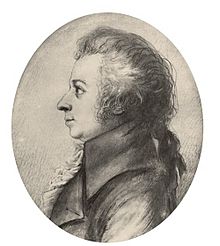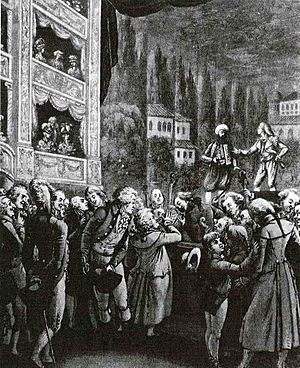Die Entführung aus dem Serail facts for kids
Quick facts for kids Die Entführung aus dem Serail |
|
|---|---|
| by Wolfgang Amadeus Mozart | |

Portrait by Doris Stock, 1789
|
|
| Genre | Singspiel in 3 acts |
| Translation | The Abduction from the Serail |
| Librettist | Christoph Friedrich Bretzner |
| Language | German |
| Premiere | Nationalsingspiel, Vienna 16 July 1782 |
Die Entführung aus dem Serail (in English: The Abduction from the Seraglio) is an opera with music by Wolfgang Amadeus Mozart. It is an example of a Singspiel: a type of German opera which had spoken dialogue as well as singing, and was often about magical stories. Mozart's opera The Magic Flute is also a Singspiel.
The German libretto is by Christoph Friedrich Bretzner and was changed a bit, without Bretzner’s permission, by Gottlieb Stephanie. The story is about the hero Belmonte, helped by his servant Pedrillo, who tries to rescue his beloved Konstanze from the seraglio (palace) of the Pasha Selim.
The opera was first performed by the Nationalsingspiel ("national Singspiel") which was sponsored by the Austrian emperor Joseph II. Mozart arrived in Vienna in 1781 and was looking for an opportunity to get a commission for an opera. He showed one his operas (Zaide) to the manager of the Nationalsingspiel. He was impressed and asked Mozart to write an opera for the company.
The work is lighthearted and meant to be funny. Some of the characters in the story are Turkish. Turkish stories and music were very popular at that time in Europe, and Mozart writes some Turkish music (or what Europeans thought was Turkish music) in this opera. Some of the arias are very difficult to sing, especially the long "Martern aller Arten" ("Tortures of all kinds") sung by Konstanze, which is like a concerto movement. She is accompanied in this aria by an orchestra and four solo instruments.
The opera was a huge success and earned Mozart a good sum of money. However, he was not paid properly for later performances, so it did not make him rich.
When Joseph II heard it he said to Mozart that there were “too many notes”, to which Mozart replied: “There are just as many notes as there should be”.
Contents
Roles
| Role | Voice type | Premiere cast, 16 July 1782 Conductor: W. A. Mozart |
|---|---|---|
| Belmonte, a Spanish nobleman | tenor | Valentin Adamberger |
| Konstanze, betrothed to Belmonte | soprano | Caterina Cavalieri |
| Blonde, Konstanze's English maid | soprano | Therese Teyber |
| Pedrillo, Belmonte's servant | tenor | Johann Ernst Dauer |
| Osmin, overseer for the Pasha | bass | Ludwig Fischer |
| Bassa Selim, the Pasha | spoken role | Dominik Jautz |
| Klaas | spoken role | Unknown |
| Chorus of Janissaries | ||
Instrumentation
The singers perform with a Classical orchestra, to which are added instruments needed for "Turkish" music: bass drum, cymbals, triangle, and piccolo. The main orchestra has pairs of flutes, oboes, clarinets, bassoons, horns, trumpets, a set of two timpani, and strings. In the aria, "Sorrow has become my lot", there is also a basset horn.
Images for kids
-
Costume study for Blonde, ca. 1830–50, by Christof Fries, Metropolitan Museum of Art
-
Illustration of the women's quarters in a seraglio, John Frederick Lewis, 1873
See also
 In Spanish: El rapto en el serrallo para niños
In Spanish: El rapto en el serrallo para niños





